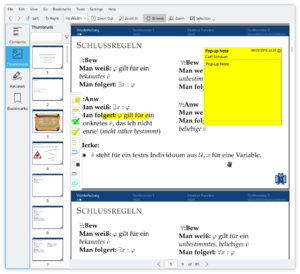Okular/ja: Difference between revisions
Updating to match new version of source page |
Updating to match new version of source page |
||
| Line 13: | Line 13: | ||
Its development began as part of Google's Summer of Code program. The description of the project can be found at [http://developer.kde.org/summerofcode/okular.html KDE Developer's Corner]. | Its development began as part of Google's Summer of Code program. The description of the project can be found at [http://developer.kde.org/summerofcode/okular.html KDE Developer's Corner]. | ||
Okular combines the excellent functionalities of [[Special:myLanguage/KPDF|KPDF]] with the versatility of supporting different kinds of documents, like PDF, Postscript, DjVu, CHM, and others. | '''Okular''' combines the excellent functionalities of [[Special:myLanguage/KPDF|KPDF]] with the versatility of supporting different kinds of documents, like PDF, Postscript, DjVu, CHM, and others. | ||
The [http://okular.kde.org/formats.php document format handlers page] has a chart describing in more detail the supported formats and the features supported in each of them. | The [http://okular.kde.org/formats.php document format handlers page] has a chart describing in more detail the supported formats and the features supported in each of them. | ||
| Line 32: | Line 32: | ||
===印刷=== | ===印刷=== | ||
In [http://forum.kde.org/viewtopic.php?f=20&t=85805&p=147758#p147758 this forum topic] a user stated that '''Okular''' could not print PDFs. The problem was traced to a corrupt ~/.cups/lpoptions. Renaming this file allows Okular to rebuild it, after which he had no more problem printing PDFs. | In [http://forum.kde.org/viewtopic.php?f=20&t=85805&p=147758#p147758 this forum topic] a user stated that '''Okular''' could not print PDFs. The problem was traced to a corrupt <tt>~/.cups/lpoptions</tt>. Renaming this file allows '''Okular''' to rebuild it, after which he had no more problem printing PDFs. | ||
=== Reviewing Documents / Annotations === | === Reviewing Documents / Annotations === | ||
| Line 40: | Line 40: | ||
How to keep the annotations you made to the PDF file: | How to keep the annotations you made to the PDF file: | ||
By default, Okular saves annotations in the local data directory for each user. Since KDE 4.9, it's optionally possible to store them directly in a PDF file by choosing | By default, '''Okular''' saves annotations in the local data directory for each user. Since KDE 4.9, it's optionally possible to store them directly in a PDF file by choosing <menuchoice>File -> Save As...</menuchoice>, so they can be seen in other PDF viewers. | ||
Note that this feature requires Poppler 0.20 or newer for regular PDF documents. If the PDF document you are annotating is encrypted, this feature requires Poppler 0.22 or newer. | Note that this feature requires Poppler 0.20 or newer for regular PDF documents. If the PDF document you are annotating is encrypted, this feature requires Poppler 0.22 or newer. | ||
[[Category:Graphics/ja]] | [[Category:Graphics/ja]] | ||
Revision as of 16:40, 21 July 2018
Okular とは?
 |
Okular is a universal document viewer for KDE SC 4.x |
You can watch for development at the project Home Page.
背景
Its development began as part of Google's Summer of Code program. The description of the project can be found at KDE Developer's Corner.
Okular combines the excellent functionalities of KPDF with the versatility of supporting different kinds of documents, like PDF, Postscript, DjVu, CHM, and others.
The document format handlers page has a chart describing in more detail the supported formats and the features supported in each of them.

As well as supporting many formats, Okular offers such features as text selection, annotation, extraction of files embedded within a document, and many other surprises. Screenshots of Okular in action can be seen here.
You can talk to developers and other users on IRC, irc.freenode.org, channel #okular.
If you are interested in contributing to Okular, please contact the team. Programmers and non-coders are welcome all the same.
ヒント
印刷
In this forum topic a user stated that Okular could not print PDFs. The problem was traced to a corrupt ~/.cups/lpoptions. Renaming this file allows Okular to rebuild it, after which he had no more problem printing PDFs.
Reviewing Documents / Annotations
Double clicking on either one of the Review tools (F6) allows you to make multiple annotations without having to reactivate the tool after the first time.
How to keep the annotations you made to the PDF file:
By default, Okular saves annotations in the local data directory for each user. Since KDE 4.9, it's optionally possible to store them directly in a PDF file by choosing , so they can be seen in other PDF viewers. Note that this feature requires Poppler 0.20 or newer for regular PDF documents. If the PDF document you are annotating is encrypted, this feature requires Poppler 0.22 or newer.
